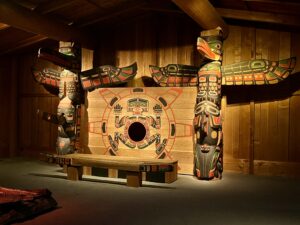A behind-the-scenes tour of the First Peoples Gallery at the Royal BC Museum left me with more questions than answers. I had hoped to walk away with a clearer understanding of how to support faculty in Indigenization and decolonization, but instead, I was confronted with the enormity of what has been taken, the painstaking efforts to return it, and the deep fractures left behind by colonialism.
Walking through the deconstructed exhibits, I saw remnants of a past that had been curated without consent, artifacts stripped from their communities and displayed for public consumption. Now, many of those same artifacts sit in boxes and plastic tubs, waiting for repatriation. The sheer scale of what has been removed from the gallery and the slow, methodical process of returning items to rightful owners underscores the weight of this work. It is not simply a museum shifting its policies; it is a reckoning with history, an attempt to repair the irreparable.

This experience forces me to reconsider what it means to Indigenize and decolonize education. Faculty often look for clear steps, a checklist or framework to follow, but if the museum’s efforts tell us anything, it is that decolonization is neither straightforward nor tidy. It is not about sprinkling Indigenous content into a syllabus or acknowledging the land before a lecture. It is about fundamentally rethinking whose knowledge is centered, whose histories are told, and who gets to define legitimacy in academia.
For me and many faculty (I think), this is uncomfortable. It should be. It means interrogating their own roles in systems built on colonial foundations. It means recognizing that Western ways of knowing have dominated for so long that Indigenous ways of knowing are often perceived as supplementary rather than foundational. It means shifting from seeing Indigenous perspectives as enriching a course to recognizing that their absence is a failure of the curriculum.
So how do we move faculty beyond acknowledgment into action? What workshops can push them from passive agreement to active engagement?
Here are some ideas:
Facing the Hard Truths: A session dedicated to confronting the history of academic institutions in Canada and their complicity in colonialism. Using case studies like the Royal BC Museum, faculty can examine how institutions have profited from Indigenous knowledge and culture, largely without consent or reciprocity.
Beyond the Land Acknowledgment: A deep dive into what meaningful land acknowledgments look like and how they can be integrated into pedagogy. Faculty would work on moving beyond scripted statements to understand what it means to be in relationship with the land and its original stewards.
Who Owns Knowledge?: A critical workshop on epistemology, who decides what counts as knowledge in academia? Faculty would engage with Indigenous knowledge systems and challenge the dominance of Western frameworks in their disciplines.
Curriculum Interrogation: A hands-on session where faculty deconstruct their own syllabi, identifying where Indigenous perspectives are missing and how they can be woven into the fabric of their courses, not as a special topic but as an essential framework.
Decolonizing Assessment: A workshop exploring Indigenous approaches to teaching and evaluation, challenging traditional grading systems and rethinking how student success is measured in ways that honor different ways of learning.
If decolonization means dismantling systems of oppression, then we must be willing to break apart the structures we have built our teaching upon. If Indigenization means making space for Indigenous voices, then it requires more than inclusion, it demands reorientation.
The museum tour was not the revelatory experience I had hoped for. It did not give me the answers, but perhaps that is the lesson. There is no single answer, no universal strategy. Instead, there is the difficult, ongoing work of unsettling what we take for granted, sitting with discomfort, and being willing to start again.